August 3, 2023
When I was looking through the Arthur Johnston Papers in the Booth Family Center for Special Collections, I noticed a letter that appeared to have been written by U.S. baseball star Joe DiMaggio to popular Hollywood music composer Arthur Johnston. As an avid baseball fan, I was excited to locate this document. The handwritten note in question is preserved in box 1 folder 7 of the Arthur Johnston Papers. The correspondent addresses Johnston as “To Arthur” and notes, “I have heard and hummed those wonderful songs and no doubt many more of yours.” The apparent signature reads, “Sincerely, Joe DiMaggio.”
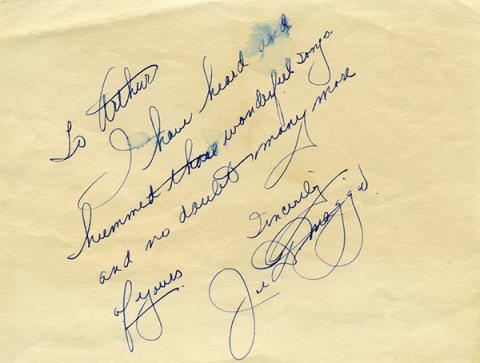
However, when colleagues and I looked at other samples of Joe’s handwriting, we found ourselves unsure about whether Joe himself had actually written it. The handwriting actually seems to more closely resemble that of his brother, Dom DiMaggio. If Dom did, indeed, write and sign this letter, it is not known why he did so; likely he would simply have been doing his brother a favor and dealing with some of Joe’s correspondence.
Joe DiMaggio (1914-1999) was an iconic center fielder for the New York Yankees. He debuted for the team in 1936. During his lengthy career, the Yankees won the World Series nine times. DiMaggio was named American League Most Valuable Player three times. He recorded an impressive lifetime batting average of .325, notched 2,214 hits and belted 361 home runs. He was perhaps best known for his 56-game hitting streak during the 1941 season, a feat which has never been eclipsed. DiMaggio retired in 1951, having played his entire career with the Yankees.
The composer Arthur Johnston (1898-1954) began playing the piano professionally early on. In 1929, he moved to Hollywood, where he composed songs for films such as College Humor, Double Or Nothing, and Pennies from Heaven. He worked with songwriters Johnny Burke, Sam Coslow, and Gus Kahn among others, and was elected to the Songwriters’ Hall of Fame in 1970. The DiMaggio note must date to 1954 or earlier, as Johnston died in 1954.
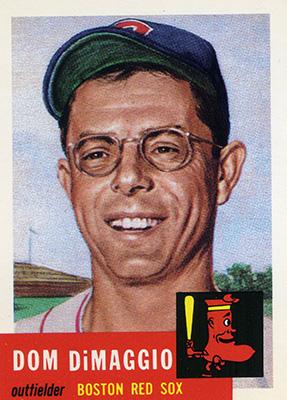
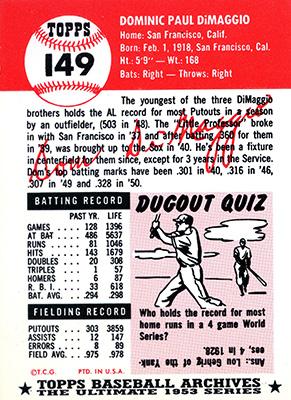
This baseball card, owned by my family, is a replica from a set of 1953 Topps cards. Dom DiMaggio (1917-2009), a younger brother of Joe, recorded a lifetime batting average of .298. He hit 87 home runs during his career, and played 11 seasons in the majors, all with the Boston Red Sox. He was an all-star seven times. Amazingly, a third and oldest DiMaggio brother, Vincent (1912-1986), also played in the major leagues for 10 years with five different teams.
Over the years, musicians have paid tribute to Joe DiMaggio in popular songs. In 1941, Betty Bonney provided the vocals for Les Brown and his orchestra (also known as Les Brown and His Band of Renown) in the song, “Joltin’ Joe DiMaggio,” which celebrated DiMaggio’s 56-game hitting streak. In 1968, Simon and Garfunkel produced the hit “Mrs. Robinson,” which alluded to the status of DiMaggio as an American hero. In 1985, John Fogerty released the song “Centerfield,” which mentioned the Yankees’ star player. And Joe found a place in the lyrics of Billy Joel’s “We Didn’t Start the Fire” in 1989. Other musicians have honored DiMaggio’s brief marriage to American actress Marilyn Monroe.
The Booth Family Center also holds two photographs of Joe DiMaggio, in Box 4 folder 65 of the extensive Clare Boothe Luce Photographic Collection. Clare Boothe Luce (1903-1987) was an American playwright, politician, and diplomat. The photos date to DiMaggio’s trip to Italy in 1955.
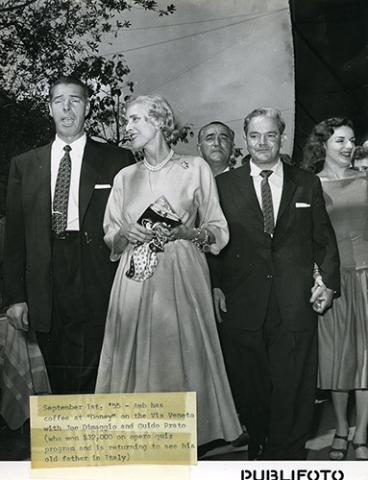
The first photograph, dated September 1, 1955, shows Joe DiMaggio standing beside Clare Boothe Luce, who was U.S. Ambassador to Italy at the time, and Guido Prato, who had recently won an opera quiz show for $32,000. The group had coffee at Restaurant Doney in Rome. The photograph was published by Publifoto of Rome, Italy.
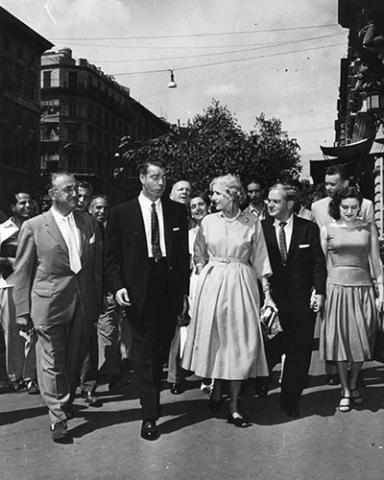
The second photograph shows the three walking together with a visibly delighted crowd behind them.
Joe DiMaggio remains an iconic figure, whose life as a celebrity had a wide-ranging impact on sports and popular culture in the United States.
Scott S. Taylor
Manuscripts Archivist
